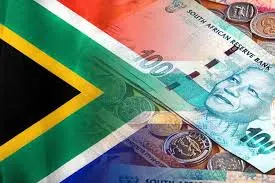By Radarr Africa
South Africa’s financial markets showed signs of renewed strength on Tuesday, as the rand firmed and government bonds rallied, supported by growing investor optimism that the country could be moving toward a lower inflation target. Analysts and traders interpreted recent signals from the South African Reserve Bank (SARB) and the National Treasury (NT) as an indication that technical discussions around adjusting the inflation framework are gaining traction.
As of 15:35 GMT, the South African rand was trading at R17.6475 against the US dollar, up about 0.3% from Monday’s closing level. Earlier in the session, the currency hit its strongest level since November 2023, buoyed by supportive sentiment in the fixed income and currency markets. Year-to-date, the rand has appreciated by more than 6%, making it one of the better-performing emerging market currencies so far in 2025.
In tandem, the benchmark 2035 government bond saw its yield drop by 11 basis points, settling at 9.855%, reflecting stronger demand and improved investor confidence in the country’s macroeconomic direction.
According to Annabel Bishop, Chief Economist at Investec, the bond market rally and the currency gains can be traced directly to recent developments surrounding South Africa’s inflation targeting policy. The SARB has consistently maintained a target range of 3% to 6%, but central bank governor Lesetja Kganyago has long argued that this band is too wide and undermines economic competitiveness, particularly in global trade and investment environments.
“There has been a decided preference from the Reserve Bank for a sharper drop in the inflation target range,” Bishop noted in a research report. “This has materially boosted investor confidence.”
While Finance Minister Enoch Godongwana has historically been more cautious about altering the inflation target, the Ministry of Finance and SARB have been quietly working together. The SARB’s annual report, released on Monday, confirmed that a joint technical team from the Reserve Bank and the Treasury is finalising recommendations on the matter, which will soon be presented to both the Governor and the Minister.
The possibility of a lower inflation target suggests a more aggressive stance toward price stability and could pave the way for stronger real interest rates and a more credible long-term economic framework—key ingredients for attracting foreign investment in emerging markets like South Africa.
Market optimism was also supported by encouraging domestic data, including improved sentiment in the manufacturing sector. A key gauge of manufacturing activity showed that confidence in June reached its second-highest level this year, though actual output remained subdued due to load shedding and other structural challenges.
Adding to the positive tone, figures from the National Association of Automobile Manufacturers of South Africa (NAAMSA) showed that new vehicle sales rose 18.7% year-on-year in June. This was significantly above expectations, with Nedbank economists having forecasted a 14.3% increase. Strong vehicle sales typically reflect improved consumer and business confidence and can act as a proxy for broader economic resilience.
On the equities front, the Johannesburg Stock Exchange (JSE) also closed in the green. The Top-40 index (.JTOPI) rose 0.5%, in line with gains across several blue-chip stocks. Investor interest remains selective, but the positive macroeconomic sentiment helped lift risk appetite across the board.
Despite these positive developments, challenges remain. Structural issues such as high unemployment, weak public finances, and the ongoing impact of Eskom’s unreliable power supply continue to weigh on long-term growth prospects. However, the rand’s resilience and the bond market rally suggest that investors are encouraged by the direction of policy discussions, particularly around inflation management and fiscal coordination.
If the SARB and Treasury succeed in redefining the inflation target in a way that is perceived as credible and growth-friendly, it could significantly strengthen South Africa’s policy framework and economic credibility in global markets.
